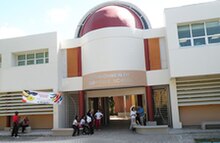센타우루스자리 제타
Zeta Centauri| 관찰 데이터 Epoch J2000.0 Equinox J2000.0 | |
|---|---|
| 콘스텔레이션 | 켄타우루스 |
| 적경 | 13h 55m 32.38565s[1] |
| 적위 | -47° 17° 18.1482°[1] |
| 겉보기 등급(V) | +2.55[2] |
| 특성. | |
| 스펙트럼형 | B2.5 IV[3] |
| U-B 색지수 | −0.91[2] |
| B-V 색지수 | - 0.22[2] |
| 아스트로메트리 | |
| 반지름 속도(Rv) | +6.5[4] km/s |
| 고유운동(μ) | RA: - 57.37[1] mas/년 Dec.: - 44.55[1] mas/년 |
| 시차()) | 8.54 ± 0.13 mas[1] |
| 거리 | 382 ± 6y (표준 ± 2 pc) |
| 절대 등급(MV) | - 2.79[5] |
| 궤도[6] | |
| 기간(P) | 8.024일 |
| 반장축(a) | 0.[7]0014인치 |
| 편심(e) | 0.5 |
| 근일점 에폭(T) | 2413719.321 JD |
| 근일점 인수()) (세컨더리) | 290° |
| 세부 사항 | |
| 덩어리 | 7.8±0.1[3] M☉ |
| 반지름 | 5.80±0.53[8] R☉ |
| 표면 중력(log g) | 3.84±0.08[8] CGS |
| 온도 | 23561±283[8] K |
| 회전 속도(v sin i) | 235[9] km/s |
| 나이 | 39.8±5.7[3] 미르 |
| 기타 명칭 | |
| 데이터베이스 참조 | |
| 심바디 | 데이터. |
센타우루스자리 제타는 센타우루스자리 남쪽의 쌍성계이다.It has the proper name Alnair /æˈnɛər/, from the Arabic[11] Nayyir Baṭan Qanṭūris (نير بطن قنطورس), meaning "The Bright (Star) of the Body of the Centaur".[12]총 겉보기 등급은 +2.[2]55로 별자리의 밝은 구성원 중 하나이다.이 시스템은 시차 기술을 사용하여 직접 거리를 측정할 수 있을 정도로 지구에 충분히 가깝습니다.이 값은 약 382광년(117파섹)[1]이며 오차범위는 1.6%입니다.그것은 초속 [4]+6.5km의 속도로 더 멀리 떠내려가고 있다.
중국어로 庫(K ló Lou)는 아스널을 의미하며 centauri 센타우루스, centauri 센타우루스, centauri 센타우루스, 2 센타우루스, HD 117440, centauri1 센타우루스, centauri 센타우루스, D 센타우루스, centauri [13]센타우루스 등으로 구성된 별자리를 말한다.따라서 센타우리의 중국 이름은 )))(K ló Lou Y), 영어: 아스널의 첫 별)이다.[14]
§ Cen은 이중선 스펙트럼 [15]쌍성계로, 도플러 효과로 인한 결합 스펙트럼의 흡수선 변화에 의해 궤도 운동이 검출되었음을 나타낸다.두 별은 궤도 이심률 약 [6]0.5로 8일이 조금 넘는 주기로 서로를 공전하고 있다.쌍의 추정 각도 간격은 1.4ms입니다.[7]
약 4천만 [3]년의 나이에 이 계의 주요 구성 요소는 B2.5 [3]IV의 항성 분류로 진화의 준거성 단계에 있는 것으로 보입니다.이것은 태양 질량의 거의[3] 8배, 반지름의 6배에 가까운[8] 큰 별입니다.이 별은 초속 [9]235km의−1 회전 속도로 빠르게 회전하고 있다.
레퍼런스
- ^ a b c d e f van Leeuwen, F. (November 2007), "Validation of the new Hipparcos reduction", Astronomy and Astrophysics, 474 (2): 653–664, arXiv:0708.1752, Bibcode:2007A&A...474..653V, doi:10.1051/0004-6361:20078357, S2CID 18759600
- ^ a b c d Johnson, H. L.; et al. (1966), "UBVRIJKL photometry of the bright stars", Communications of the Lunar and Planetary Laboratory, 4 (99): 99, Bibcode:1966CoLPL...4...99J
- ^ a b c d e f Tetzlaff, N.; Neuhäuser, R.; Hohle, M. M. (January 2011), "A catalogue of young runaway Hipparcos stars within 3 kpc from the Sun", Monthly Notices of the Royal Astronomical Society, 410 (1): 190–200, arXiv:1007.4883, Bibcode:2011MNRAS.410..190T, doi:10.1111/j.1365-2966.2010.17434.x, S2CID 118629873
- ^ a b Wilson, R. E. (1953), "General Catalogue of Stellar Radial Velocities", Carnegie Institute Washington D.C. Publication, Carnegie Institute of Washington D.C., Bibcode:1953GCRV..C......0W
- ^ Anderson, E.; Francis, Ch. (2012), "XHIP: An extended hipparcos compilation", Astronomy Letters, 38 (5): 331, arXiv:1108.4971, Bibcode:2012AstL...38..331A, doi:10.1134/S1063773712050015, S2CID 119257644.
- ^ a b Maury, A. C. (1922), "The Orbit of the Spectroscopic Binary ζ Centauri", Harvard College Observatory Circular, 233: 1–4, Bibcode:1922HarCi.233....1M
- ^ a b Halbwachs, J. L. (April 1981), "List of Estimated Angular Separations of Spectroscopic Binaries", Astronomy and Astrophysics Supplement, 44: 47, Bibcode:1981A&AS...44...47H
- ^ a b c d Fitzpatrick, E. L.; Massa, D. (March 2005), "Determining the Physical Properties of the B Stars. II. Calibration of Synthetic Photometry", The Astronomical Journal, 129 (3): 1642–1662, arXiv:astro-ph/0412542, Bibcode:2005AJ....129.1642F, doi:10.1086/427855, S2CID 119512018
- ^ a b Bernacca, P. L.; Perinotto, M. (1970), "A catalogue of stellar rotational velocities", Contributi Osservatorio Astronomico di Padova in Asiago, 239 (1): 1, Bibcode:1970CoAsi.239....1B
- ^ "* zet Cen". SIMBAD. Centre de données astronomiques de Strasbourg. Retrieved 2012-03-01.
- ^ Kunitzsch, P.; Smart, T. (2006), A Dictionary of Modern star Names: A Short Guide to 254 Star Names and Their Derivations (2nd revised ed.), Cambridge, MA: Sky Pub, p. 4, ISBN 978-1-931559-44-7
- ^ 아이비드, 페이지 28
- ^ (in Chinese) 中國星座神話, written by 陳久金.2005년 발행, ISBN 978-986-7332-25-7.
- ^ (중국어) AEEA (천문학 전시회 및 교육 활동)2006년 7월 25일
- ^ van Rensbergen, W.; De Loore, C.; Jansen, K. (February 2006), "Evolution of interacting binaries with a B type primary at birth", Astronomy and Astrophysics, 446 (3): 1071–1079, Bibcode:2006A&A...446.1071V, doi:10.1051/0004-6361:20053543



